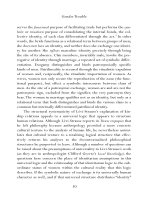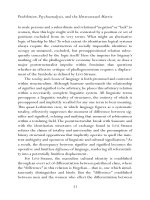GENDER TROUBLE 87
Bạn đang xem bản rút gọn của tài liệu. Xem và tải ngay bản đầy đủ của tài liệu tại đây (20.43 KB, 1 trang )
Gender Trouble
men eludes the dialectic altogether. In other words, the differentiating
moment of social exchange appears to be a social bond between men, a
Hegelian unity between masculine terms that are simultaneously specified and individualized.7 On an abstract level, this is an identityin-difference, since both clans retain a similar identity: male, patriarchal, and patrilineal. Bearing different names, they particularize themselves within this all-encompassing masculine cultural identity. But
what relation instates women as the object of exchange, clothed first
in one patronym and then another? What kind of differentiating
mechanism distributes gender functions in this way? What kind of differentiating différance is presupposed and excluded by the explicit,
male-mediating negation of Lévi-Strauss’s Hegelian economy? As
Irigaray argues, this phallogocentric economy depends essentially on
an economy of différance that is never manifest, but always both presupposed and disavowed. In effect, the relations among patrilineal
clans are based in homosocial desire (what Irigaray punningly calls
“hommo-sexuality”),8 a repressed and, hence, disparaged sexuality, a
relationship between men which is, finally, about the bonds of men,
but which takes place through the heterosexual exchange and distribution of women.9
In a passage that reveals the homoerotic unconscious of the phallogocentric economy, Lévi-Strauss offers the link between the incest
taboo and the consolidation of homoerotic bonds:
Exchange—and consequently the rule of exogamy—is not simply
that of goods exchanged. Exchange—and consequently the rule of
exogamy that expresses it—has in itself a social value. It provides the
means of binding men together.
The taboo generates exogamic heterosexuality which Lévi-Strauss
understands as the artificial accomplishment of a nonincestuous heterosexuality extracted through prohibition from a more natural and
unconstrained sexuality (an assumption shared by Freud in Three Essays
on the Theory of Sexuality).
52









